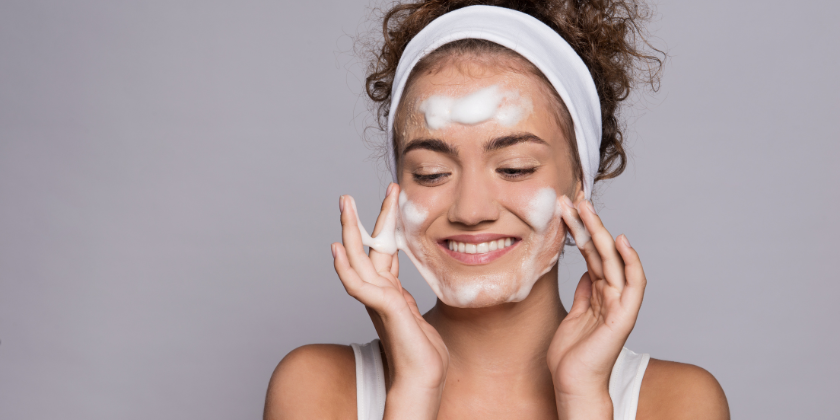Acne is one of the most common skin conditions, affecting over 85% of us at some point in our lives. It’s also one of the most frustrating conditions to manage and treat. But at The Beauty Within, we have a few ancient acne secrets up our sleeves. Let’s get an insight into our specific
In this article, we’ll dive into the basics of acne, then cover the main ways we can reverse this pesky skin condition with Traditional Chinese Medicine and healthy habits.
Acne Basics
Before we dive into the different types of acne in Chinese Medicine and our Chinese Medicine Approach to Acne, let’s take a closer look at what acne really is. Acne is a skin condition that occurs at the pilosebaceous unit, the area where the hair bulb, hair shaft, and sebaceous gland meet.
In normal circumstances, the sebaceous gland produces sufficient sebum or oil to nourish and protect the skin .But for various reasons (especially hormone imbalance), these glands can release too much sebum which then mixes with bacteria and dead skin cells and clogs the pores.
The result? Breakouts whether whiteheads or blackheads. In many serious cases, inflammation develops acne into deeper lesions such as papules, pustules, nodules, or cysts.
Conventional dermatology theory views acne as a skin condition mostly related to hormone imbalances or genetics. Other problems, such as exposure to grease or oils and increase friction or pressure on the skin, can lead to potential causes.
Acne According to Chinese Medicine Theory
Like all things in Chinese Medicine, acne is not considered one single “condition”, but the outcome of a range of different patterns of imbalance.
This indicates that each acne case is managed depending upon the individual’s specific patterns with a Chinese Medicine Approach to Acne.
Every person’s skin varies from one another but certain patterns appear commonly. Here we will get an insight into every pattern so you can find the one suiting your skin type.

"Wind-Heat-Type" Acne
- What it looks like: Red acne, especially on the nose and cheeks.
- Organ System it affects: Lung
- What it is: According to Chinese Medicine Theory, the Lungs are directly linked to the skin.
- When lungs get affected by heat and inflammation, it appears as irritation on the skin. Many different skin problems come under this pattern (like hives or eczema), including acne.
Chinese Medicine can help improve this kind of acne by:
- Reducing inflammation
- Encouraging cooling blood flow to the skin
- Balancing the Lung system
Lifestyle tips to clear wind-heat acne:
- Stay hydrated
- Choose foods like almond, apricot, asparagus, licorice, pear, tangerine, beef, turkey, glutinous rice, tofu, cauliflower, yam
- Avoid dairy and spicy, hot, salty, or fried foods
"Damp-Heat-Type" Acne
- What it looks like: Sore, red breakouts that are pus or fluid-filled.
- They appear on the forehead, around the mouth, or chin
- Organ System it affects: Large Intestines and Stomach
- What it is: When heat and excess fluids get together in the body, trouble ensures. “Damp-heat” is a term specific to Chinese medicine that is the root cause of many health conditions. While we can understand heat as increased body temperature and inflammation, dampness is the result of fluids congealing or becoming stagnant. This includes extracellular fluids, mucus, and pus. Damp-heat is closely related to diet choices and therefore happens to impact the Large Intestine and Stomach (digestive organs).

Chinese Medicine manages this type of acne by:
- Cooling excess heat
- Transforming and clearing away dampness
- Enhancing the digestive function to prevent dampness
- Reducing inflammation
- Improving blood flow
Lifestyle tips to clear damp-heat acne:
- Stay hydrated
- Drink warm lemon water in the mornings
- Choose foods like apple, apricot, cucumber, dates, eggplant, lemon, maltose, mung bean, orange, olive, pear, sweet potato, tomato
- Avoid dairy and spicy, hot, salty, alcohol, sugar, and fried foods
"Qi Deficiency and Phlegm-Type" Acne
- What it looks like: Pus-filled, deep, cystic-type acne. Tends to accompany digestive issues.
- Organ System it affects: Spleen
- What it is: Spleen Qi may sound like a strange term, but it basically refers to our overall vitality and ability to make more energy.
- When Spleen Qiis insufficient, the body is unable to function properly. It results in accumulation of dampness and the incapacity to expel foreign materials. So, the skin’s pores become blocked with bacteria, dirt, or dead skin cells and develop into cystic acne.
Chinese Medicine caters to this kind of acne by:
- Supporting the Spleen system to return to balance
- Improving the body’s energy
- Transforming and clearing away dampness
- Enhancing the digestive function
- Reducing inflammation
- Improving blood flow
- Relieving pain if present

Lifestyle tips to clear Qi deficiency acne:
- Stay hydrated
- Choose foods like buckwheat, cardamom, carrot , cinnamon, clove, dill seed, fennel, garlic, ginger, ginger powder, lamb, mustard, mustard seed, nutmeg, orange peel, pepper (black, red, white), pork, rice, root vegetables (cooked), salmon, string bean
- Cook your foods lightly by steaming or sautéing
- Avoid heavy, greasy foods, excess carbohydrates, and sugar
- Exercise (mild to moderate) daily

















